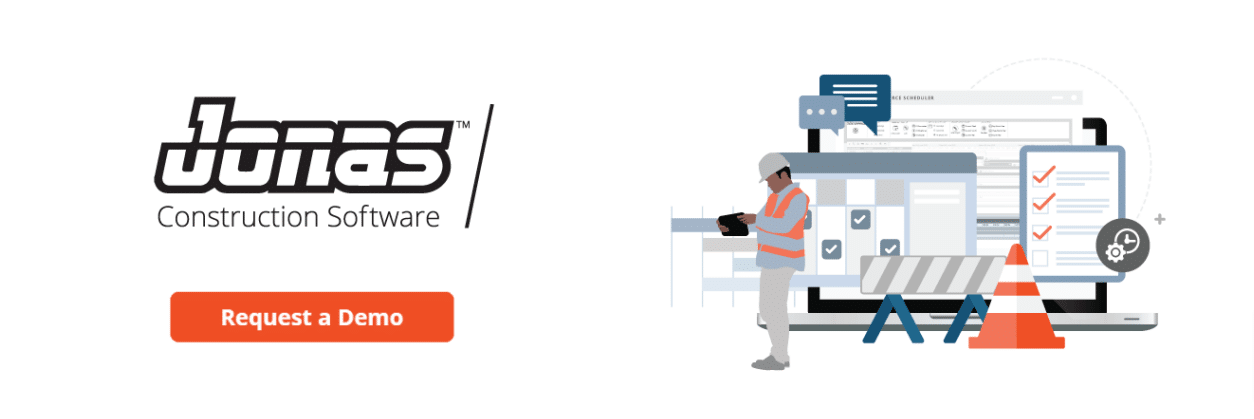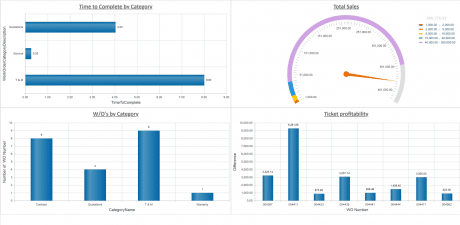Last Updated on July 4, 2024
Today’s construction industry is fast-paced and globally competitive, constantly evolving with the demands of modern projects and their maintenance. Meanwhile, contractors face unprecedented challenges with increasing interest rates, labor shortages, and supply chain disruptions.
Internally, service and construction businesses often deal with limited job cost visibility, manual processes, or communication delays, contributing to inefficient and complex operations. This can lead to project delays and cost overruns, threatening both the business profits and cash flow. The riskiest part is you may not be able to identify the source of these threats. Contractors must, therefore, look for effective strategies to combat these risks.
A significant 56 per cent of construction businesses now rely on specialized construction management software (CMS) to streamline their workflows, enhance efficiency and boost productivity. CMS encompasses a range of modern tools and solutions to seamlessly integrate different operational aspects, including project scheduling, job costing, service management, document management, reporting and more, all within a single platform.
In this blog, we will explore the value construction management software can add to your business and how you can leverage it.
What is Construction Management Software?
Construction management software is a specialized technology solution that empowers construction businesses to effectively plan and manage projects, resources, and stakeholders involved. With a wide array of functionalities, it automates and optimizes key project management tasks, such as daily internal communications, project scheduling, job costing, document management, and reporting.
By ensuring data integration between the field and back-office operations, CMS enables construction project managers to gain job cost visibility, increase operational efficiency, and make informed and timely decisions, thereby better managing cost overruns and protecting profits.
The Value of Construction Management Software
Construction management software adds value to service and construction businesses by automating workflows, optimizing resource allocation, and gaining more accurate data tracking and reporting by integrating the back office with field operations.
As a centralized hub for the field and back office operations, effective construction management software should be able to integrate various job processes, tasks, and data to reduce cost misallocations, duplicate entries, and inaccurate data, while making your entire business more operationally efficient.
Let’s dive deeper into how construction management software can add value to a business by enabling its stakeholders to navigate challenges, mitigate risks, and steer projects towards a profitable and successful completion.
Enhance Operational Efficiency
Construction businesses often rely on multiple software systems to manage various areas of their business, including project management, accounting and payroll, service management, and CRM. While this multi-software approach can be cost-effective and meet initial functional needs, it often presents challenges in achieving operational efficiency as a business grows. Some of these challenge may include maintaining legacy systems and coordinating the timely flow of information from one software to the next.
When disparate software systems are used in tandem, businesses frequently face issues of duplicate data entry, additional costs of third-party integrations, and the risk of inaccuracies in critical data like invoices, time logs, labor units, and equipment usage.
This is where integrated construction management software can step in to connect the field operations with the back-office processes. Construction management software helps businesses automate and optimize workflows for the office and field, improve data accuracy, and reduce the costs and complexities associated with manual software integrations. By doing so, construction management software can help construction businesses enhance and maintain productivity with less time and resources, and effectively improve their operational efficiency.
Access to Accurate Data
Construction projects are impacted by dynamic factors, such as resource availability (material, labor and equipment), change orders, and changing project scope/schedule with subcontractors or clients. Construction professionals therefore need access to accurate and timely data on costs, change orders, and purchase orders in order to effectively respond to any changes or issues that arise.
When an integrated construction management software solution is absent from a service and construction business, the business could be at risk for delayed, incomplete and inaccurate data, leading to inaccurate job costs, cost overruns and project delays.
The culprit could be manual processes, communication delays (among field personnel, back-office, subcontractors, suppliers, and clients) or disparate systems for project management, accounting, and payroll.
Integrated construction management software that unifies the field and back office operations eliminates double data entry and ensures that the field data entered is automatically associated with the correct project phase and cost type at the back office. And as a result, more accurate data is readily available for processing and review.
Better Collaboration between the Field and Back Office
As mentioned previously, integrated construction management software unifies the field and back office on one centralized platform to improve communications across the entire business.
Having an integrated CMS can help facilitate clear communication, prevent misunderstandings, and standardize information sharing on change orders, RFIs, submittals and transmittals. By having critical data changes from these sources directly imputed from the field to the software, service and construction businesses can reduce the chances of miscommunication between the field and back office, and focus on working together to achieve project goals.
Simplified Cost Management and Budget Tracking
Did you know nine out of ten construction projects experience cost overruns. This highlights a critical challenge in the construction industry: effective cost management.
Construction management software that integrates project management with construction accounting can be a game changer in keeping your project’s budget on track.
By offering real-time data integration between the field and back office, it ensures every dollar is accurately tracked and allocated across various project components, such as labor, materials, equipment, subcontractors, and overheads.
This leads to more precise job cost and WIP reports, enabling project managers to gain valuable insights into project finances, make informed decisions and undertake proactive cost control measures.
Streamline Workflows and Processes
Construction projects typically involve multiple stakeholders, including contractors, subcontractors, field and back office staff, clients, and suppliers. One of the problems construction professionals may face is the lack of coordination among these project stakeholders. This in turn can result in double data entry errors, disrupted workflows and difficulty in managing project schedules, thereby leading to project delays.
With a centralized document management system and a more direct flow of data from the field to the back office, construction management software facilitates more accurate information sharing and improved communication on tasks and project status for all team members.
CMS integrated with automated construction accounting software can streamline your workflows and processes by driving the automation of manual processes. Operational data inputted from the field like time entry and change orders can be automatically allocated and transformed as accounting and cost data for the back office and project managers.
Improve Customer Satisfaction
Meeting and exceeding customer expectations is essential for building trust and ensuring project success. However, construction professionals often deal with delivery delays, miscommunication between stakeholders, and cost overruns, which can undermine client trust and satisfaction.
Integrated construction software provides tools for better project planning, scheduling, and resource and time tracking, ensuring projects are executed and delivered on time to the clients’ satisfaction.
Features like client portals allow clients to view real-time project and work order updates, documents, and reports, making them feel more involved and informed about the progress of their projects
How Jonas’ Construction Management Solution Can Add Value to Your Business
Now that you’ve explored the benefits of construction management software, let us help you with the next steps of adopting a specialized construction software solution.
With Jonas’ integrated construction software, you can seamlessly integrate various construction processes and tasks into one cohesive platform, empowering your team to work more efficiently. From accounting and project scheduling to time tracking and job costing, Jonas provides a complete suite of solutions to meet your construction management needs. Backed by accounting automation and superior cost reporting, Jonas enables construction businesses to:
- increase enterprise operational efficiency by integrating field and back-office,
- enhance cash flow predictability and
- identify profit fade for projects and contracts.
Take your next step towards improving profitability and streamlining your operations with Jonas Construction Software. Request a demo today to get started.





